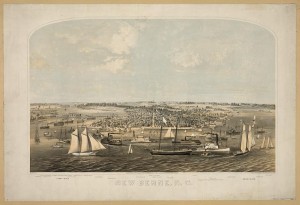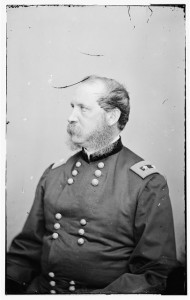Union “soldier mob” demolishes rebel shooter buildings; detachment sent to clean out guerrilla band.
The 19th New York Volunteer Infantry completed its conversion to the 3rd New York Artillery and arrived in North Carolina in the spring of 1862. Here’s a letter home from a member of Battery (née Company) C.
From a Seneca County, New York newspaper in 1862:
From North Carolina.
BACHELOR’S CREEK, N.C.
July, 30, 1862.
During the past week many incidents both pleasant and exciting, have occurred to break the dull monotony of camp life. – Newbern presents a beautiful appearance with her innumerable shade trees and beautiful gardens; and, indeed, were it not for the ugly ruins and war like defences of the place one would hardly know that the devastations of war had been visited upon her.
Citizens are every day returning – many of whom I fear without the most honorable intentions, as late developments will show.
A few nights since, the guard stationed in that position of the city most inhabited by fisherman and the poorer classes, was fired upon and severely wounded. The house was immediately surrounded, and its inmates, (seven men,) arrested and lodged in jail. The following day a strict search was instituted, which resulted in finding in it, and the adjoining houses, a quantity of fire arms, and a keg of powder. The buildings were soon demolished by the soldier mob. Since then all suspicious houses, have been searched, and over one hundred different styles of fire arms, found. One of the men arrested, acknowledges he fired the shot and has been recognized as a paroled soldier taken at Roanoke. Rumor says he is to be hung.
For a long time a roving band of guerrillas have been prowling about the country in the vicinity of our camp. (Bachelor’s Creek, seven miles west of Newbern, on the lines of the A.A.N.C.R.R.) and committing lawless depredations on the property of men known Union proclivities. The commanding officer of the post, after making several applications to Gen. FOSTER, received an order to “clean them out.” On Sunday after noon it was rumored around the camp, that a scouting expedition was on foot, and great was the speculation as to when it was to start. But we were not kept long in suspense; soon the order came to be in readiness to march the next morning at 3 o’clock, which time found us a mile on our road. Our force was about 70 men, all told and consisted of 15 3d N.Y. Cavalry; 1st section of Battery C. 3d N.Y. Artillery, and detachments of Co. D and H. of the 27th Mass. taking an N.-W. course we struck the road running from Newbern to Kingston, commonly called the Neuse, about 4 o’clock, and six miles from camp. We were now in the vicinity of the “Rebs,” and much caution was necessary. We had not proceeded far, when turning a short bend in the road, we came suddenly upon the post of the outer piquet. He was a brave fellow, and very cooly aimed his carbine at the Cavalry Sergeant, but the cap snapped without igniting the powder; putting on a fresh cap, he tried again, but with no better success – throwing away his carbine he fled for the woods.The house near by – the reported headquarters of the band – was surrounded and searched, but the bird had flown. An old man, however, was taken, who informed us that at the house of one French, a notorious rebel, two miles further up the road, were quartered a detachment of the 2d N.C. Cavalry. Thither we bent our steps, but had not gone far, when we ran upon another nest of the day-farmers and midnight marauders. From very superior use of their limbs they escaped, but not until a volley had been fire after them. Again we took up our lines of march at a rapid rout step, until within one hundred rods of the house, when Lieut. RANDOLPH, commanding the artillerymen, (then acting as infantry,) proceeded to the rear, while the cavalry and remaining infantry took the front.The attack was admirably planned, and reflects credit upon the officer in command. I venture to say men were never more surprised then were they when our cavalry and infantry came down upon them with one of those “awful yells,” at a double quick. A few rods in rear of house grew a thick clump of bushes, into which several of them rushed. But their movements had been anticipated and they soon found themselves subject to the tender mercies of the “jayhawkers,” better known as the “old nineteenth.” Others seeing this dodge was played out, made for the woods; but as a large field was to be crossed, many of them were run down by our cavalry, while the most obstinate ones were either killed, or wounded, but few escaping unharmed. The rout was complete as appearances at the house would indicate. – Clothing, or rather rags, were thrown hither and thither in promiscuous confusion; some had left their breakfast (hoecake and bacon,) half eaten, while others were preparing it. The morning work resulted nearly as follows: killed, 2; wounded, 1; captured, 12; others that were known to be wounded escaped. Their whole force consisted of twenty men and a Lieutenant. – the horses secured, twenty in number, were all fine animals and well trained to the saddle. They were armed principally with the old breech loading carbines, horse pistols and rusty sabres, all of which were secured by the boys as trophies. The buildings were all fired, and we were in camp before 10 o’clock, having traveled a distance of nearly 18 miles. This is what I call doing a day’s work before breakfast.
The prisoners taken are withal, well informed men, and expressed no little surprise at the kind treatment they received at our hands. They are now in jail, and have, I understand, declined taking the oath of allegiance.
TYPO.
John Gray Foster assumed command of the Department of North Carolina on July 6, 1862 after General Burnside transferred to Virginia.


